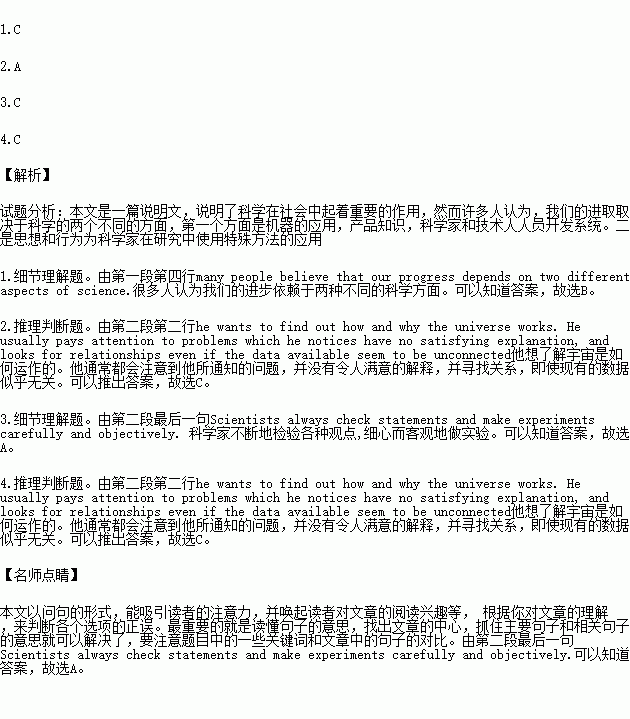题目内容
What is the nature of the scientific attitude, the attitude of the man or woman who studies and applies physics, biology, chemistry, geology, engineering, medicine or any other science?
We all know that science plays an important role in our societies. However, many people believe that our progress depends on two different aspects of science. The first aspect is the application of the machines, products and systems of knowledge that scientists and technologists develop. The second is the application of the special methods of thought and action that scientists use in their work.
What are these special methods of thinking and acting? First of all, it seems that a successful scientist is curious - he wants to find out how and why the universe works. He usually pays attention to problems which he notices have no satisfying explanation, and looks for relationships even if the data available seem to be unconnected. Moreover, he thinks he can improve the existing conditions and enjoys trying to solve the problems which this involves.
He is a good observer, accurate, patient and objective and uses the facts he observes to the fullest. For example, trained observers obtain a very large amount of information about a star mainly from the accurate analysis of the simple lines that appear in a spectrum(光谱).
He does not accept statements which are not based on the most complete evidence available. He rejects authority as the only basis for truth. Scientists always check statements and make experiments carefully and objectively.
Furthermore, he does not readily accept his own idea, since he knows that man is the least reliable of scientific instruments and that a number of factors tend to disturb objective investigation.
Lastly, he is full of imagination since he often has to look for relationships in data which are not only complex but also frequently incomplete. Furthermore, he needs imagination if he wants to guess how processes work and how events take place.
These seem to be some of the ways in which a successful scientist or technologist thinks and acts.
1.Which of the following statements about a curious scientist is TRUE?
A. He doesn’t find confidence and pleasure in work.
B. He is interested in problems that are explained.
C. He makes efforts to investigate potential connections.
D. He looks for new ways of acting.
2.According to the passage, a successful scientist would NOT______.
A. easily believe in unchecked statements.
B. easily criticize others' research work.
C. always use his imagination in work.
D. always use evidence from observation.
3.Which word can be used to describe the data that a good scientist uses?
A. complete B. concrete
C. complicated D. confusing
4. What does the passage mainly discuss?
A. Application of technology.
B. Progress in modern society.
C. Successful scientists' ways of thinking and acting.
D. How to become a successful scientist.
 高中必刷题系列答案
高中必刷题系列答案

